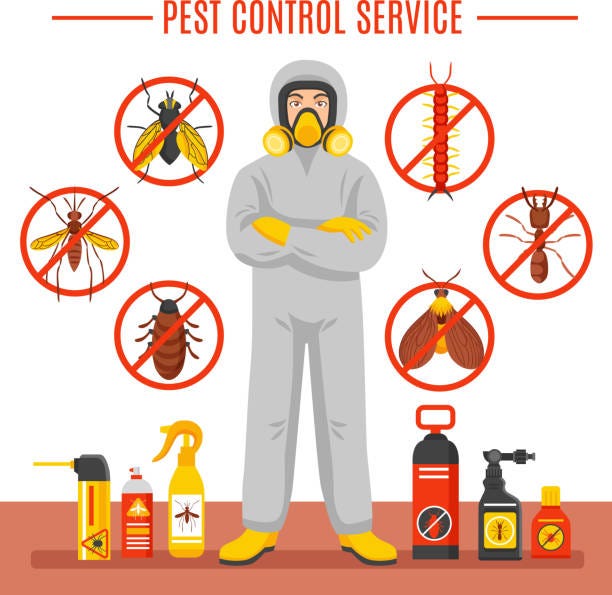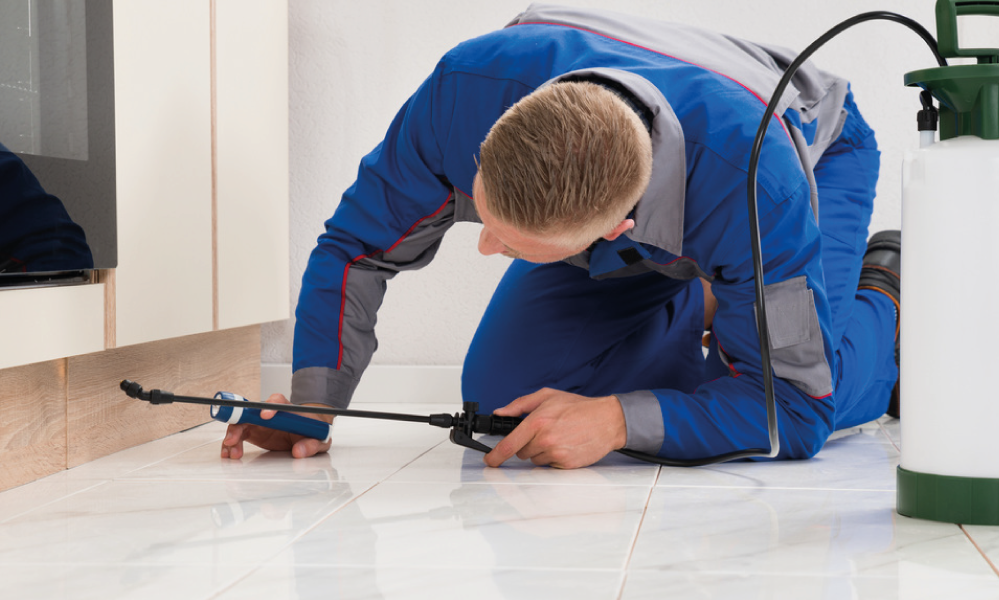Recognizing the Various Strategies to Insect Control: A Comprehensive Overview

Natural Pest Control Methods
Using eco-friendly strategies such as friend planting and biological pest control is crucial for properly handling insects in farming setups. Companion growing includes growing various crops in closeness to prevent insects, enhance nutrient uptake, and improve total crop health.
Organic bug control involves presenting natural predators or virus to manage pest populations. Ladybugs, as an example, feed upon aphids, regulating their numbers without the requirement for chemical pesticides. Another instance is making use of Bacillus thuringiensis (Bt), a microorganism that targets particular insect parasites while being safe to humans, pets, and valuable pests.
These eco-friendly approaches not only lower the reliance on artificial chemicals but likewise aid protect biodiversity and dirt health. By integrating all-natural pest control methods right into agricultural methods, farmers can attain sustainable insect monitoring while minimizing unfavorable influences on the environment.

Chemical Bug Control Solutions
Along with all-natural pest control techniques, the application of chemical insect control options plays a significant function in properly managing pest populations in agricultural atmospheres. Chemical bug control solutions are formulated to target particular parasites that might create comprehensive damage to crops. These services commonly contain synthetic pesticides that are developed to eliminate insects rapidly and effectively.
One of the essential advantages of chemical pest control solutions is their effectiveness in controlling pest problems widespread. Farmers can use these options utilizing various methods such as splashing, airing out, or seed therapy to secure their crops from hazardous insects, weeds, and diseases. In addition, chemical parasite control options are fairly easy to apply and can offer rapid outcomes, aiding farmers secure their yields and reduce economic losses.
However, it is essential to use chemical pest control solutions judiciously to decrease prospective unfavorable impacts on the environment, non-target microorganisms, and human health and wellness. Correct application methods, adherence to security standards, and routine monitoring are essential to ensure the liable use chemical bug control services in agricultural techniques.
Biological Parasite Control Approaches
Biological parasite control comes close to leverage all-natural predators or virus to handle insect populations in farming setups properly. This approach uses a sustainable and environmentally friendly remedy to pest monitoring, decreasing the dependence on synthetic chemicals and decreasing harm to the atmosphere. One usual biological control technique is the intro of natural enemies, such as ladybugs or parasitical wasps, to target details pests. These killers feed on the parasites, helping to regulate their populaces read this normally - pest control clovis.
Another organic control technique involves making use of microorganisms like fungi, microorganisms, or viruses to contaminate and kill parasites. Generally, biological bug control methods offer a lasting and targeted service to pest management in farming.
Integrated Insect Management (IPM)
Integrated Parasite Administration (IPM) is an extensive strategy that combines numerous bug control strategies to effectively take care of and minimize pest populaces in agricultural systems. IPM concentrates on lasting prevention of parasites with a mix of biological, social, physical, and chemical control methods. By integrating these different techniques, IPM aims to decrease dependence on chemical pesticides, decrease environmental effect, and advertise lasting pest administration techniques.
One trick element of IPM is the usage of organic controls such as natural killers, bloodsuckers, and virus to regulate insect populations. This approach takes advantage of the power of nature to maintain a balance between bugs and their all-natural adversaries without triggering damage to the environment.
In addition, IPM entails cultural practices like crop cleanliness, rotation, and habitat adjustment to develop negative problems for bugs and interrupt their life process. Physical controls such as traps, barriers, and mulches are additionally made use of to stop parasite invasions.
Physical and mechanical Bug Control Methods
Utilizing non-chemical approaches, such as physical and mechanical bug control methods, is an essential aspect of thorough pest management approaches, building on the foundation of Integrated Pest Monitoring's alternative method. Mechanical pest control entails making use of physical obstacles or catches to prevent bugs from accessing and damaging crops or frameworks. This technique can include techniques like mounting published here screens on home windows, utilizing row covers in agriculture, or utilizing sticky traps to capture insects.
Physical parasite control techniques, on the other hand, concentrate on directly removing insects through physical ways. Using warm therapies to eliminate bed pests or vacuuming up pests like crawlers or ants can be reliable ways to handle problems without the use of chemicals. By integrating these mechanical and physical bug control strategies into an Integrated Bug Management plan, experts and people can reduce reliance on chemicals while still effectively reducing and taking care of pest populations damage.
Final Thought

In addition to all-natural insect control approaches, the use of chemical insect control solutions plays a substantial duty in properly handling pest populaces in agricultural settings.One of the crucial advantages of chemical bug control solutions is their performance in managing parasite invasions on a huge range.Integrated Pest Monitoring (IPM) is an extensive strategy that combines numerous pest control methods to effectively handle and minimize pest populations in site web farming systems.Utilizing non-chemical techniques, such as mechanical and physical parasite control techniques, is a critical aspect of detailed pest administration approaches, building upon the foundation of Integrated Bug Administration's holistic approach. By incorporating these physical and mechanical bug control techniques into an Integrated Insect Administration strategy, professionals and people can decrease dependence on chemicals while still effectively managing pest populations and lessening damage.
Comments on “Trusted Pest Control Clovis: Protecting Your Building”